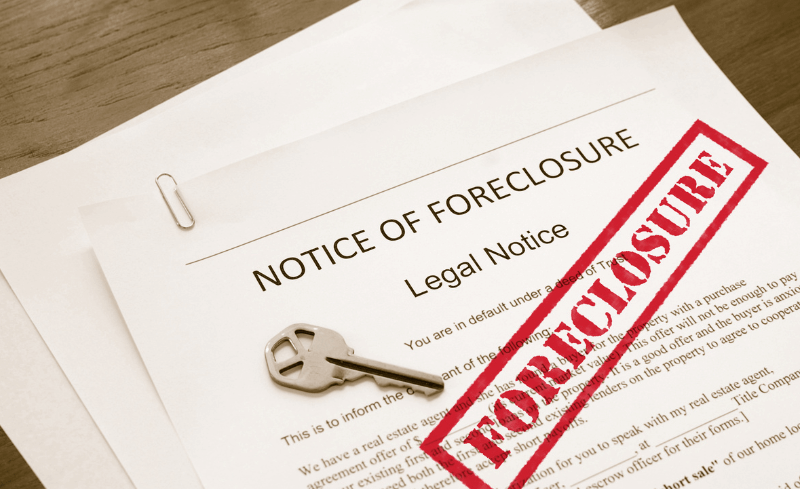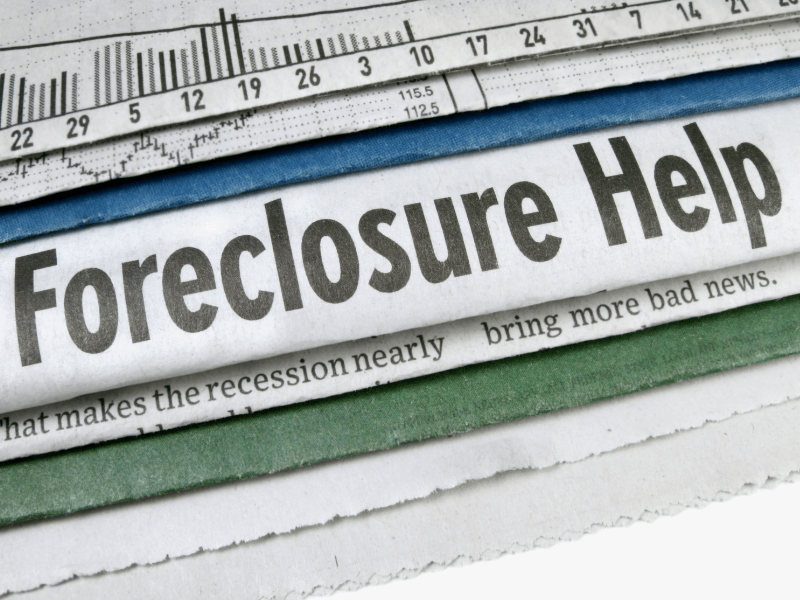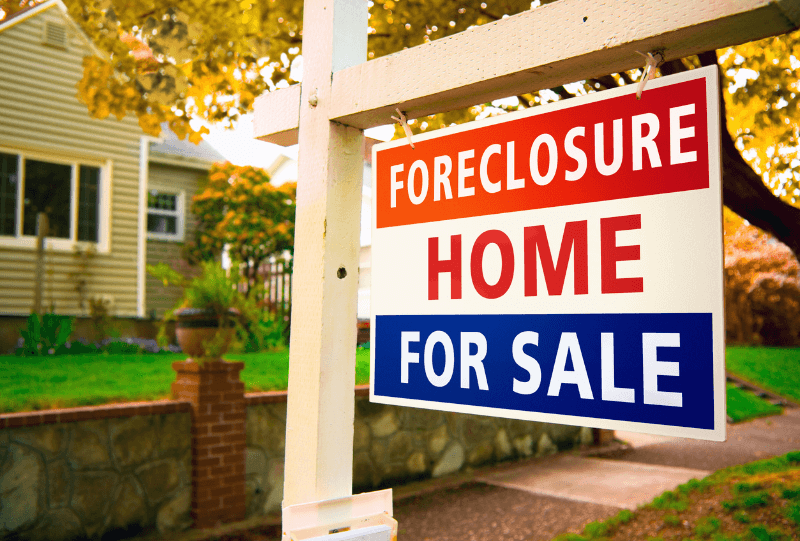
No homeowner desires to encounter the possibility of losing their home due to financial difficulties. Unfortunately, many individuals end up in this predicament unexpectedly. The looming threat of foreclosure progresses as time ticks away putting their shelter at risk. Nonetheless, in dire situations, there exist legal measures and options for delays that can provide a last-minute reprieve for homeowners.
This article delves into these solutions offering a glimmer of hope and practical guidance to those desperately seeking to stop foreclosure and safeguard their homes. We explore the complexities of the relationships between lenders and borrowers, the consequences of missed mortgage payments, the intricacies of Chapter 13 bankruptcy, and the details surrounding foreclosure sales. Whether you are in need of counsel contemplating a loan modification or simply aiming to gain an understanding of foreclosure procedures this comprehensive guide will provide valuable insights to help navigate through these challenging circumstances.
When Is It Too Late to Stop Foreclosure?
The foreclosure process does not occur instantly; rather it is a sequence that presents homeowners with opportunities to intervene and protect their homes. The initial phase known as foreclosure commences when a homeowner falls behind on mortgage payments and receives a default notice from their lender.
This phase is highly important as it offers an array of choices to prevent foreclosure effectively. As the process moves forward homeowners still have legal options available. It’s always possible to halt foreclosure until the property is sold at an auction. Once the property has been sold through foreclosure it becomes challenging to stop the process. Despite this challenge, some homeowners have successfully reversed the sale after this stage. It requires significant legal knowledge and is uncommon.
Therefore homeowners should consult with experts as soon as they encounter financial difficulties that hinder their mortgage payments. Meeting with a foreclosure lawyer or housing advisor, for guidance can help homeowners understand their options better ranging from modifying loans to filing for Chapter 13 bankruptcy that can put a hold on foreclosure proceedings. Regardless of how it may seem homeowners must remember that time is of the essence and seeking assistance is never too late.
The Complete Foreclosure Timeline
In Texas, the foreclosure timeline follows state regulations that every homeowner should be familiar with. Understanding the timeline is crucial, for homeowners facing the possibility of foreclosure. It all starts with missing a mortgage payment and receiving the default notice from your lender marking the beginning of the foreclosure phase. During this period there are opportunities to stop the foreclosure process and protect your home. This timeline can span months providing chances to seek legal counsel or consider options like loan modifications, short sales or even filing for Chapter 13 bankruptcy. Each stage in this timeline is vital. Knowing what to anticipate can mean the distinction between losing your home or successfully navigating through foreclosure.
- Day 1 – Missed Payment: The timeline kicks off when a homeowner fails to make a mortgage payment. Typically a payment is considered missed if it’s not received by the end of the month. While some mortgage agreements may offer a grace period it usually doesn’t extend beyond 15 days past the date.
- Day 16 – Late Fees Applied: Beyond this point, late fees are likely to be imposed by the lender. The amount of these fees varies based on the terms outlined in the mortgage agreement.
- Day 30 – Notice of Default: If within 30 days of missing a payment no action has been taken by the homeowner to rectify it then a notice of default could be issued by the lender. Please note that lenders are not required by law to wait for 30 days before initiating the foreclosure process.
- Day 45 – Notice of Intent to Accelerate: If the homeowner fails to resolve the default issue after receiving the notice the lender can move forward by issuing a Notice of Intent to Accelerate. This notification specifies that the entire loan balance must be paid and if not settled foreclosure proceedings will commence.
- Day 60 – Notice of Sale: If the homeowner has not rectified the situation yet Texas regulations mandate that lenders give a minimum of 21 days’ notice prior to the foreclosure sale. This notice will contain information regarding when, where, and at what time the sale will take place.
- Day 81 – Foreclosure Sale: If by this point the homeowner has not halted the foreclosure process their property will be auctioned off to the bidder in a sale. Depending on whether its a tax lien or nonjudicial foreclosure there may still be an opportunity for them to reclaim their property within a timeframe.
It’s important to remember that while this timeline is a guideline each foreclosure case is unique and state laws differ. It’s advisable to seek legal counsel if you find yourself facing foreclosure.
Texas Information on When It’s Too Late to Stop Foreclosure
In Texas, the foreclosure process moves swiftly typically taking around 3 months from the missed payment to the actual sale of the property. Homeowners in this situation must be aware of when it might become too late to intervene and what options are at their disposal to avoid reaching that point.
Once a Notice of Sale is issued ( around 60 days after missing the payment) it signals the lender’s intent to auction off the property publicly. This marks a juncture leaving homeowners with 21 days before the foreclosure sale. Despite this timeframe, there are still potential avenues to explore.
One option is pursuing Chapter 13 bankruptcy. While it may have repercussions on one’s credit score it can trigger a pause in foreclosure proceedings. Provide an opportunity to devise a repayment plan. It’s advisable to engage a bankruptcy attorney for guidance in navigating this step for results.
Another route is negotiating a loan modification with your lender. This entails adjusting mortgage terms to make monthly payments more manageable. However, success hinges on the lender’s willingness to collaborate. May not be feasible, for all individuals.
Finally, you could also consider a sale or a deed in lieu of foreclosure. While these choices may not save your home they could potentially reduce the impact on your credit score compared to going through a foreclosure process. It’s important to note that each situation is unique and the options mentioned above are not exhaustive. It’s advisable to seek counsel from a foreclosure attorney or consult with a housing counselor to fully understand all choices and their implications. Time is crucial in scenarios. Taking action increases the chances of averting foreclosure.
Can You Actually Stop a Foreclosure?
Indeed stopping a foreclosure is achievable but it requires action and thorough exploration of all avenues. Apart from considering bankruptcy or loan modifications another option is pursuing a sale. With a sale, the homeowner sells the property at a loss. Can sidestep some of the adverse effects of foreclosure by settling the loan for less, than its total amount owed. Lenders might agree to this arrangement if they see it as a means of recovering part of the mortgage.
Additionally entering into a forbearance agreement is another option exploring. In a forbearance agreement, the lender agrees to lower or pause the homeowner’s mortgage payments for a period. Once this time is up the homeowner will resume making payments. May need to pay an additional lump sum or extra partial payments to catch up on the loan.
Another option is reinstatement, where the homeowner pays the lender the amount they’re behind, in one lump sum by a specific date. This option is often used alongside forbearance when the homeowner expects funds from a bonus, tax refund, or another source to be available at a time in the future.
Lastly, challenging the foreclosure may be an alternative especially if there was an error in processing your application or if your lender violated any laws. In situations having representation is crucial.
How to Stop a Foreclosure
In addition, to the options, there are other methods to stop a foreclosure process. Let’s delve into them further.
Chapter 7 Bankruptcy
Opting for Chapter 7 bankruptcy is another avenue that homeowners can pursue to stop a foreclosure. After filing for Chapter 7 bankruptcy a ” stay” is initiated, which immediately halts legal actions such as lawsuits, repossessions, and debt collections. However, it’s important to note that this pause in foreclosure proceedings doesn’t release the homeowner from their mortgage obligations. Monthly payments still need to be made during this period. If the mortgage company completes the foreclosure before bankruptcy is filed there’s a risk of losing the home.
Additionally filing for Chapter 7 bankruptcy can harm your credit score significantly making it challenging to access credit or loans on. Seeking advice from a bankruptcy attorney or specialized law firm before proceeding with this option is crucial. They can provide guidance on the process. How it may impact your finances.
In essence, while Chapter 7 bankruptcy can offer relief from foreclosure it may not be a lasting solution for everyone. Before making a decision it’s crucial to understand the possible outcomes and impact.
Chapter 13 Bankruptcy
Chapter 13 bankruptcy offers a more long-term solution compared to Chapter 7 especially when dealing with the risk of losing your home. With Chapter 13 homeowners can reorganize their debts into a payment plan lasting three to five years. What makes Chapter 13 unique is its ability to stop foreclosure proceedings and give homeowners a chance to catch up on missed mortgage payments.
A key feature of Chapter 13 bankruptcy is the ” stay” provision, compared to what’s found in Chapter 7 which immediately puts a hold on most debt collection activities, including foreclosures. This protection stays active throughout the repayment plan giving homeowners some breathing room to stabilize their finances.
Moreover, Chapter 13 allows for restructuring mortgage debts, like credit card bills and legal expenses. This can free up funds each month that can be used towards mortgage payments helping homeowners keep up with their obligations and avoid foreclosure risks.
However, it’s important to remember that while Chapter 13 bankruptcy can offer relief for those facing foreclosure there are also downsides to consider.
Filing for bankruptcy can have an effect on your credit score. May remain on your credit report for as long as seven years. This might pose challenges when trying to obtain loans or credit in the future. Before proceeding with Chapter 13 bankruptcy it is essential to consult with an expert. Seeking advice from a bankruptcy lawyer or a reputable law firm can assist you in navigating the process, grasping the consequences of your choices over time, and deciding on the most suitable steps to take based on your individual financial situation.
Loan Modification
An alternative way to stop foreclosure proceedings is, through a loan modification. This involves an agreement between the borrower and the lender to adjust the terms of the mortgage of the contract. A loan modification can lead to an interest rate, a term, a different loan type or even a reduction in principal amount. For lenders, it can be a cost option compared to foreclosure.
The main aim of a loan modification is to make monthly payments more manageable. For homeowners experiencing difficulties reducing mortgage payments to a level can provide the relief needed to prevent foreclosure. It’s crucial to note that obtaining a loan modification requires lender approval and your chances of getting one largely depend on demonstrating hardship.
Successfully negotiating a loan modification enables homeowners to keep their homes and avoid foreclosure. However, it’s essential to understand that while a modified loan affects your credit score it typically has consequences, more than foreclosure. Additionally, navigating this process can be intricate. Demands documentation and comprehension of mortgage regulations.
Hence it is recommended to consult with a professional or a seasoned real estate agent who has experience in dealing with loan modifications to effectively navigate through this procedure.

Could Selling Your House As-Is Be the Best Option?
When deliberating on ways to steer clear of foreclosure, opting to sell your house as-is could emerge as a solution. This approach entails selling your property in its condition without the need for any repairs or enhancements. Property owners often resort to this method when they are facing strain and require a swift resolution. This tactic can prove advantageous if you’re up against a foreclosure notice and have limited time to spruce up your property for a sale.
If you’re looking to sell your house fast in Houston or any other city for that matter engaging a cash home buyer can speed up the process. Cash home buyers, or real estate investors, directly purchase properties eliminating the involvement of real estate agents and their associated commission charges. Furthermore, cash home buyers are usually indifferent to the property’s state. They are prepared to undertake any repairs or renovations. This translates into an expedited selling process and instant cash, in hand allowing you to meet your commitments and sidestep the last-minute frenzy associated with foreclosure.
However, it’s important to weigh the downsides of selling your property in its condition. You might end up with an offer that’s lower than the market value since the buyer would be taking on the responsibility and cost of any needed repairs. Nonetheless, some homeowners see the chance to avoid foreclosure and costly repairs as outweighing any setbacks.
Moreover, many cash home buyers won’t charge realtor fees. They also might assist with closing costs, which could help mitigate any losses. In addition, selling to a cash buyer means skipping open houses and showings which can be emotionally draining and time-intensive. It also grants you control over the sale process since you won’t have to deal with challenging mortgage lenders or extensive client relationships.

Conclusion
To sum up, if you’re in a situation where mortgage or property tax foreclosure is looming, selling your house as is to a cash buyer could be an option. However, keep in mind that each circumstance is unique so it’s wise to explore all your choices and seek guidance for making a decision.
In wrapping up this discussion it’s evident that navigating away from foreclosure can bring about stress and uncertainty.
During these times there are solutions available to help you navigate through. One effective option is to consider selling your house to a cash buyer, in Houston. These buyers are skilled at streamlining the property purchase process, which can alleviate the stress and financial burden of facing foreclosure.
If you own property in Texas and are thinking about selling your house fast in Fort Worth, reaching out to a company like Cash Home Buyer could prove to be a great choice. Remember, regaining control of your circumstances is achievable. It just requires taking that step towards finding the right solution.
DISCLAIMER: This article is meant for educational purposes only and is not intended to be construed as financial, tax, or legal advice. Cash Home Buyer always encourages you to reach out to an advisor regarding your own situation.
